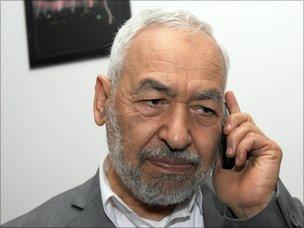Tunisian Islamist leader Rachid Ghannouchi returns home
- Published
Thousands of people gather for Rachid Ghannouchi's arrival
The leader of Tunisia's main Islamist movement has returned home after 22 years in exile following the ousting of President Ben Ali earlier this month.
Thousands of people went to the airport to welcome Rachid Ghannouchi, 69, as he arrived in Tunis from London.
He has said he will not run in the next presidential poll but his party will contest a parliamentary election.
Observers say his return is the most potent symbol yet of the change that has swept the country since then.
Mr Ghannouchi fled Tunisia after a crackdown President Ben Ali against his banned Ennahda movement.
He returned after the interim government's announced that media curbs would be lifted, banned political parties allowed to register and political prisoners given amnesty.

Ghannouchi: 'No ambition to run for office'
Up to 10,000 young men and veiled women packed the arrival hall and car park at the airport, and some climbed trees and electricity pylons to catch a glimpse of Mr Ghannouchi, according to Reuters.
Alongside his supporters, the news agency said, was a small group of secularists with banners reading: "No Islamism, no theocracy, no Sharia and no stupidity!"
"I myself will not run for the presidency... We (Ennahda) have no intention of fielding a candidate in the upcoming presidential election," he said.
Life sentence
Mr Ghannouchi told the BBC in a interview last week that officials from Mr Ben Ali's former party, the RCD, should leave the transition government, and that Tunisia could benefit from a coalition government that would build consensus, at least for the next few years.
Ennahda aimed to work with other former opposition groups in the October 18 Movement, founded in 2005, towards a democratic transition, he said.
"All of these parties operated against the dictatorship regime and [can] co-operate to establish a democratic system in Tunisia."
He added that his Ennahda party was committed to a moderate Islamist approach and working within a democratic framework.
"We accept democracy without any restrictions and we accept the decision of the people whether they come with us or against us," he said.
He rejected comparisons that he said had been made in some Western media reports between him and Ayotollah Khomeini of Iran - who returned to Iran from exile to lead the Islamic Revolution there - comparing Ennahda instead to Turkey's Justice and Development Party (AKP).
Officially, Mr Ghannouchi is still subject to a life sentence in Tunisia imposed in his absence for allegedly plotting against the state.
But the AFP news agency says that other convicted exiles have been able to return to Tunisia in recent days without hindrance.
In 1989 Ennahda came second to the ruling party in elections, officially winning about 17% of the ballot. However allegations of fraud marred the vote and according to some estimates Ennahda's tally was as much as double the official figure.